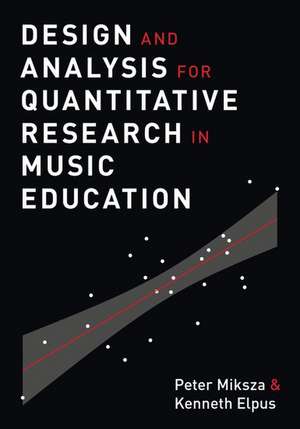Design and Analysis for Quantitative Research in Music Education
Autor Peter Miksza, Kenneth Elpusen Limba Engleză Paperback – 5 apr 2018
| Toate formatele și edițiile | Preț | Express |
|---|---|---|
| Paperback (1) | 198.15 lei 31-37 zile | |
| Oxford University Press – 5 apr 2018 | 198.15 lei 31-37 zile | |
| Hardback (1) | 703.98 lei 31-37 zile | |
| Oxford University Press – 29 mar 2018 | 703.98 lei 31-37 zile |
Preț: 198.15 lei
Preț vechi: 216.47 lei
-8% Nou
Puncte Express: 297
Preț estimativ în valută:
37.92€ • 39.69$ • 31.56£
37.92€ • 39.69$ • 31.56£
Carte tipărită la comandă
Livrare economică 20-26 martie
Preluare comenzi: 021 569.72.76
Specificații
ISBN-13: 9780199391912
ISBN-10: 0199391912
Pagini: 304
Ilustrații: 86
Dimensiuni: 249 x 175 x 20 mm
Greutate: 0.52 kg
Editura: Oxford University Press
Colecția OUP USA
Locul publicării:New York, United States
ISBN-10: 0199391912
Pagini: 304
Ilustrații: 86
Dimensiuni: 249 x 175 x 20 mm
Greutate: 0.52 kg
Editura: Oxford University Press
Colecția OUP USA
Locul publicării:New York, United States
Recenzii
There is a sense that the text written by Miksza and Elpus is a model of research thinking ... unique in its thoroughness ... Miksza and Elpus have been successful in publishing a document that can be a continuing resource and reference throughout a student's education and career.
The authors' obvious attention to careful explanation and rationale which precedes each analysis technique was time extremely well spent. This ensures that the flow of mathematics which follows these discussions is subsequently more easily grasped. The entire book, although especially Part 2, provides dozens of graphs, formulas and tables, showing the concepts in a visual form. ... This book is highly recommended for mixed methods research and quantitative methodology approaches in the field of music or music education.
In summary, this book is unique in the field of music education and explains, in clear language, many groupings of research designs along with the appropriate analyses that music education researchers use.
The authors' obvious attention to careful explanation and rationale which precedes each analysis technique was time extremely well spent. This ensures that the flow of mathematics which follows these discussions is subsequently more easily grasped. The entire book, although especially Part 2, provides dozens of graphs, formulas and tables, showing the concepts in a visual form. ... This book is highly recommended for mixed methods research and quantitative methodology approaches in the field of music or music education.
In summary, this book is unique in the field of music education and explains, in clear language, many groupings of research designs along with the appropriate analyses that music education researchers use.
Notă biografică
Peter Miksza is Associate Professor of Music (Music Education) at the Indiana University Jacobs School of Music and an affiliate member of the Indiana University Cognitive Science Program. He teaches courses in instrumental music education, the pyschology of music, learning processes in music, measurement and assessment in music, and research methods. He earned his PhD and Master of Music degrees from the Indiana University Jacobs School of Music and his Bachelor of Music degree and K-12 teaching credential from The College of New Jersey. Dr. Miksza's scholarship is focused on self-regulated music learning, musical skill acquisition, music teacher preparation, and music education policy.Kenneth Elpus is Assistant Professor of Music Education at the University of Maryland, where he teachers courses in choral music education, research methods, and conducts the university Treble Choir. Dr. Elpus earned his PhD and Master of Music degrees from Northwestern University where he held a fellowship in the Center for the Study of Education and the Musical Experience. He earned his Bachelor of Music degree and K-12 teaching credential from The College of New Jersey. Dr. Elpus's scholarship is focused on issues related to music education and public policy, the demographics of music students, the process of selection into music education, and music education as a context for adolescent development.
